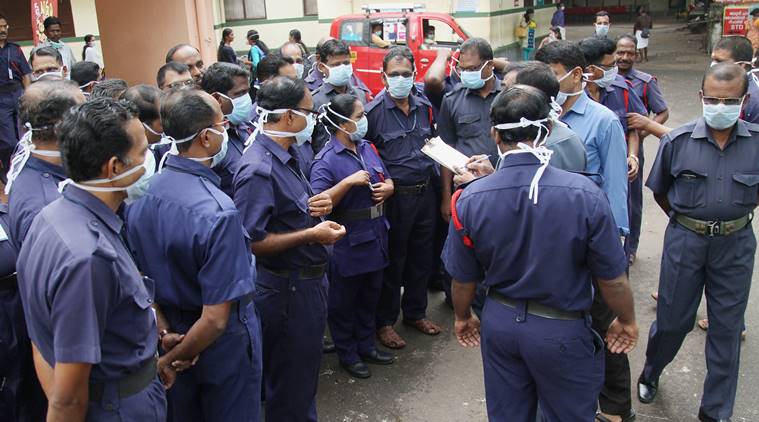 Security staff being given instructions by the head after the outbreak of Nipah virus at Medical College in Kozhikode on Saturday. (PTI Photo)
Security staff being given instructions by the head after the outbreak of Nipah virus at Medical College in Kozhikode on Saturday. (PTI Photo)
Earlier this month, Dr G Arun Kumar, head of the Manipal Centre for Virus Research (MCVR), was working on a project of the Centre for Disease Control (CDC), Atlanta, to trace the cause of fever leading to hospitalisations across 10 states. While following up on a case, he was first able to detect the Nipah virus infection that has led to 14 deaths in Kerala.
On May 17, Kumar received a call from Dr Anoop Kumar, a doctor at the Baby Memorial Hospital in Calicut, about the death of Muhammed Sabith due to encephalitis (brain fever). Two members of Sabith’s family, his father and brother, had also been admitted to the hospital.
“We immediately took the samples and ruled out Herpes simplex encephalitis and Japanese Encephalitis… the needle of suspicion pointed to Nipah virus and within 12 hours of the laboratory receiving the samples, we confirmed that the infection was positive for this rare virus. Immediately, the medical community and state health department were put on high alert, while the National Institute of Virology in Pune re-confirmed that the samples were positive for Nipah virus,” said Kumar.
The MCVR lab, a Grade 1 virus research and diagnostic laboratory of the Indian Council of Medical Research, was set up in 2010. It was the first lab to detect the Nipah virus infection in Kozhikode. So far, 171 persons have been tested for the virus, of whom 16 were found to be positive. Nearly 900 people are under daily surveillance, said Kumar. “…The immediate response to the situation helped,” he said. Kumar said precautions have been taken to prevent hospital-based infections. Currently, each blood, urine or throat swab sample sent to the lab is considered a high risk one, he said.
The study that helped detect the virus — on hospital-based surveillance of acute febrile illness (those with symptoms of fever) in India — has been going on since 2014, said Kumar.
“This study has enlisted 33 sub-district hospitals across the 10 states of Maharashtra, Kerala, Goa, Gujarat, Tamil Nadu, Karnataka, Odisha, Jharkhand, Assam and Tripura, to understand the major causes of fever leading to hospitalisation. The study has helped build the diagnostic capacity at the laboratory and in August last year, the CDC imparted training on diagnosing Nipah virus infection,” he said.